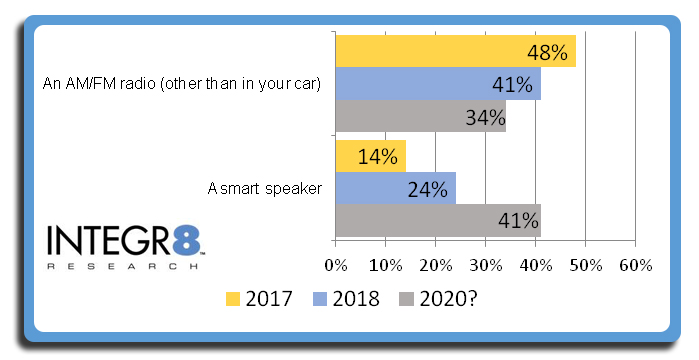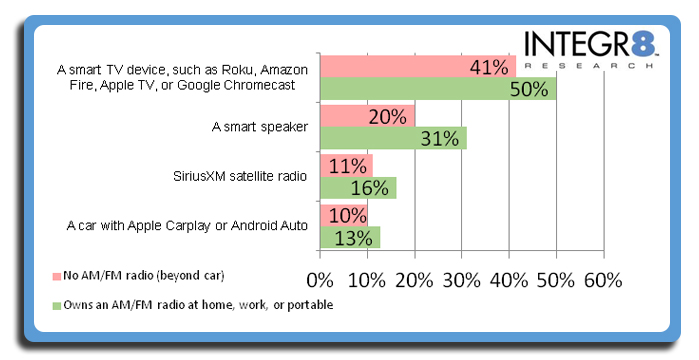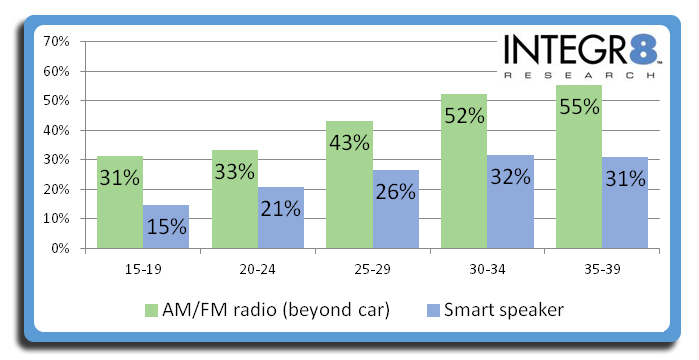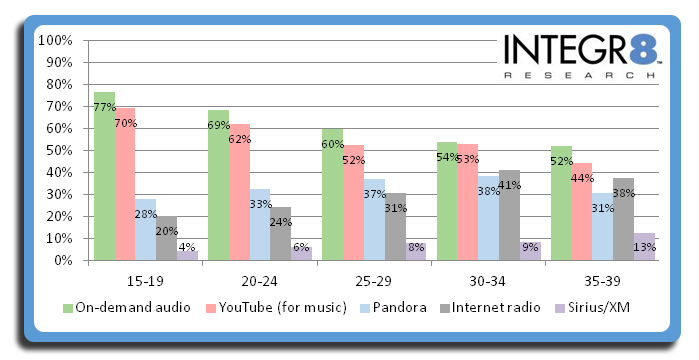Part three of a five-part blog series, “The Alexa Effect: How Radio Can Thrive in a Connected World”
After coming to grips with the reality that clock radios, boom boxes, Walkmans (“Walkmen”?) and stereos weren’t a part of the 21st century home, radio programmers assured themselves that today’s connected devices would simply replace those old radios as the utility people use to play their stations. In a perfect world, listeners would ask Alexa or Google to play their favorite local station, seamlessly transitioning from our terrestrial signal to our stream.
Is that actually what’s happening?
To find out, we examined different devices that 15- to 39-year-old contemporary radio format partisans own—including smart speakers and traditional radios—as well as all the different ways folks listen to music.
YES, smart speakers could outnumber radios by 2020
Beyond the car, regular radios are indeed vanishing. Only 41% still own a radio at home, at work, or a portable, down from 48% in 2017. Unsurprisingly, smart speaker ownership has grown conversely, from 14% to 24%.

What Devices Do You Own?
At this rate, it is easily foreseeable that sometime in 2020, more 15- to 39-year-old listeners will have a smart speaker in their home than will own an AM/FM radio.
BUT, listeners who don’t own radios also don’t own smart speakers
Right now, however, there’s a big problem if smart speakers are our plan for replacing clock radios: Listeners who don’t own radios beyond their cars are actually less likely to own all kinds of smart devices compared to people who still do own radios at home. That includes Smart TVs like Roku, Connected Car systems like Apple CarPlay, and yes—smart speakers such as Amazon Echo and Google Home.

What Devices Do You Own?
A big reason is that these listeners tend to be younger—and young people don’t yet have as much money to buy stuff—including smart speakers.

What Devices Do You Own? (by age)
“But even younger listeners will have smart speakers soon, and then they’ll play our station on it…right?”
AND, younger listeners prefer on-demand to radio
Just as younger listeners are less likely to own a radio at home, younger listeners are also the most likely listeners to prefer on-demand services where they control what they hear, while those older listeners who are most likely to own radios and smart speakers are also the most likely listeners to like services that offer curated, hosted music programming—or as we like to call it—radio.

Services Listeners Use for Music (by age)
It’s probably inevitable that younger people will eventually spring for smart speakers—but what they ask those smart speakers to play is far from inevitable.
So if today’s under 25 listeners simply prefer picking their own music on Spotify and YouTube to services that curate music for them, is there any hope for terrestrial radio to hang on to younger listeners? Should radio try to emulate on-demand services to make our stations more appealing?
We’ll explore why your station might be pursuing the wrong kind of listener in our next post.
Watch The Alexa Effect Webinar

Pingback: Report: Smart Speakers To Pass Radio In 2020 - Radio Ink
Pingback: Radio 4.0. USA: Integr8: tra 15-39 nel 2020 piu’ smart speaker che ricevitori FM. Nel 2019 sotto 40% i secondi. Da noi stesso trend entro il 2023. Ma Radio fanno troppo poco per spiegare utilizzo – Logika SEO
Pingback: Encuentra tu podcast favorito con Google Podcasts - Vía Podcast
Pingback: Integr8 Research Study Reveals Smart Speaker Ownership Pacing To Surpass AM/FM Radio Ownership By 2020 ~ Zonkersmusic.Stream News
Pingback: This Is Radio Nowhere - Is There Anybody Alive Out There | Music Biz 101
Pingback: Who Is Streaming Your Station? - Radio Ink
Pingback: Marketers: You've Been Warned - Oxford Road